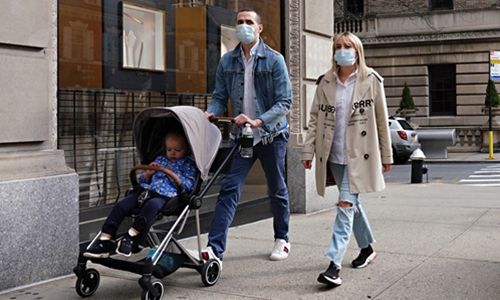US, Europe not ready to restart economy: Global Times editorial
Source:Global Times Published: 2020/4/14 21:43:40

A family walk on Madison Avenue wearing protective masks during the coronavirus pandemic on April 08, 2020 in New York City. Photo: AFP
The COVID-19 epidemic situation in Europe has shown signs of easing. In the US state of New York, the region where the epidemic situation is the worst in the country, new confirmed cases and deaths have declined. These all indicate that the anti-epidemic measures adopted in the past period have produced results.But it is hard to tell whether an inflection point has appeared in the Europe and US. Such little relief cannot justify the resumption of work in Europe and the US. In major European countries, the number of daily new confirmed cases and deaths are still higher than China's data during the peak of its epidemic. Needless to say, the US still has more than 20,000 new confirmed cases and over 1,000 deaths every day. From an epidemiological point of view, the epidemic is still serious in Europe and the US.
The European Commission last week provided a "roadmap to exit the restrictive measures," proposing that coronavirus lockdowns can be ended if a country sees a significant decrease in confirmed cases and its hospitals have sufficient capacity to receive newly infected patients. If such guidance is followed, many European countries will be able to meet the standards and restart their economies.
There is no such public document in the US, but a similar attitude could be found from many US officials' remarks. They hope to seek a "balance" between restoring the economy and fighting the epidemic. But for them, the economy seems to outweigh public health.
The US has failed to stop the coronavirus outbreak despite repeated warnings. Politics has dominated their decision-making process. The same logic is now still prevailing. The US and Europe will hardly focus more on minimizing the number of infections and deaths than resuming economic activity.
An economic shutdown can be more detrimental to the ruling parties of the US and European countries than the pandemic. For the US, it is a capitalist country after all where maintaining economic activities is given higher priority than humanitarianism and is the basic way to keep society running.
Economic activities are also fundamental to the world. However, the ongoing pandemic has proven that they have subversive power that we were not familiar with before. Restoring economic activities must cause no harm and ensure that an epidemic rebound won't happen. Otherwise, even if economic activities are revived, they won't be sustainable. This is common sense. But we worry that it will be ignored again in some countries.
WHO has advised countries lifting control measures to meet criteria including: controlling the transmission; putting in place a health system to detect, test, isolate and treat every COVID-19 case and trace every contact; preventative measures in workplaces and other places where people may gather. The criteria are scientific. But the US and European countries cannot meet most of them.
More importantly, a balance between restarting economy and controlling the epidemic is very fragile. Once the epidemic rebounds, it would cause huge damage. Some Americans and Europeans haven't given up the idea of "herd immunity." It needs to be pointed out that the reason why the epidemic in the US and Europe has been somewhat alleviated is that they have adopted social distancing measures and refused a "herd community."
The US and Europe do not have the ability to really implement "herd immunity." In fact, they have implemented the highest possible level of epidemic prevention that their societies can accept. If their prevention is relaxed, the risk of an epidemic rebound will be very high.
Once the epidemic is repeated in Europe and the US, or spreads around the epicenters worldwide, it will disastrously continue. China is on guard against imported cases and is struggling to seek a balance between resumption of work and epidemic prevention. We understand deeply that a country cannot resume economic activity recklessly and that no country can wall itself off from the pandemic. Amid the pandemic, all countries are more like living in a community with a shared future than ever.
Posted in: EDITORIAL